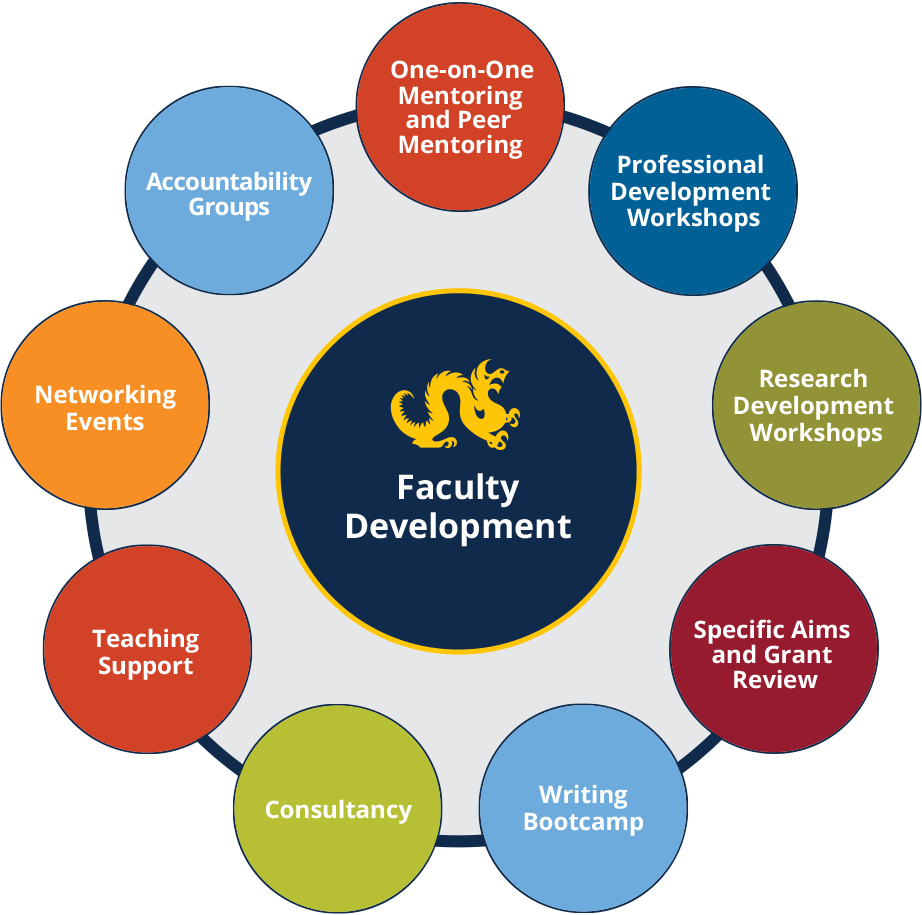Faculty Development
Supporting, Developing the Drexel FIRST Faculty
The Drexel FIRST Faculty Development Core (FDC) is responsible for developing and providing best practices, mentoring, and support for Drexel FIRST faculty.
The goals of the Faculty Development Core include:
Professional Development
The FDC aims to implement best practices for mentoring, support the career development of the FIRST faculty cohort, and prepare them for successful promotion and tenure.
Research Development
The FDC supports the research development of the FIRST cohort to maximize their ability to obtain R01-type research funding by their third year on faculty.
High-Impact Health Disparities Research
Drexel FIRST is building a community of assistant professors with a special focus on health disparities (from population health to intervention) and increasing high impact interdisciplinary research on health disparities research at Drexel University.
Faculty Development Activities
The Faculty Development Core supports a set of evidence-informed activities designed to help advance the careers of Drexel FIRST faculty.
Faculty development activities include:
The Drexel FIRST Mentorship Council partners with department chairs to select one-on-one mentors for cohort faculty based on overlapping research interests and mentee identified needs.
The program also periodically monitors satisfaction with mentoring for both mentees and mentors.
The Drexel FIRST grant is utilizing both formal and informal approaches for implementing peer mentoring within the program.
Drexel FIRST professional development workshops address a variety of research topics including:
- Types of NIH grants
- Navigating the grant submission and review process
- Grant components and budgeting
- Manuscript writing
- Tips for successful grant writing
- Building and managing a lab or research group
- Effective writing strategies
- Building external collaborations
The Drexel FIRST Research Bootcamp is a structured activity offered regularly with the goal of providing dedicated, concentrated time and space for the development of grant proposals.
A dedicated system of rapid feedback facilitates opportunities for FIRST faculty to develop competitive grant proposals.
Drexel FIRST Faculty can submit specific aims for review on an ongoing basis.
The program also conducts mock reviews of full grant proposals timed around NIH submission deadlines for the purpose of ensuring proposal effectiveness.
Each quarter the Drexel FIRST faculty cohort meet senior researchers with overlapping research knowledge for 90 minutes to problem-solve career and research challenges using the consultancy model.
FIRST faculty participate in at least one workshop through the Drexel Teaching and Learning Center (TLC).
The TLC provides an array of events and workshops aimed at becoming more effective teachers, including a series on developing antiracist pedagogy.
Each FIRST faculty member will receive an evaluation from the CNHP Master’s Teaching Guild.
Periodic networking events provide opportunities for FIRST faculty to meet University leaders and other partners and potential collaborators across the University.
Writing Accountability Groups (WAGs) are peer groups with a highly structured format to support writing practices.
WAGs meet regularly for a 10-week cycle in groups of four-to- eight members to support Drexel FIRST faculty cohort members.
Each Drexel FIRST faculty member has a sponsorship plan that reflects their strengths and goals.
The FIRST Sponsorship Committee works closely with department chairs and individual mentors to uncover opportunities to advocate and promote the FIRST faculty, raising their institutional visibility at Drexel and, more broadly, through the research community.
A Drexel-wide forum to discuss exciting work and ideas related to health equity.
The monthly series includes Drexel-based and invited external speakers whose work is relevant to health disparities research, ranging from etiology to intervention and policy.



